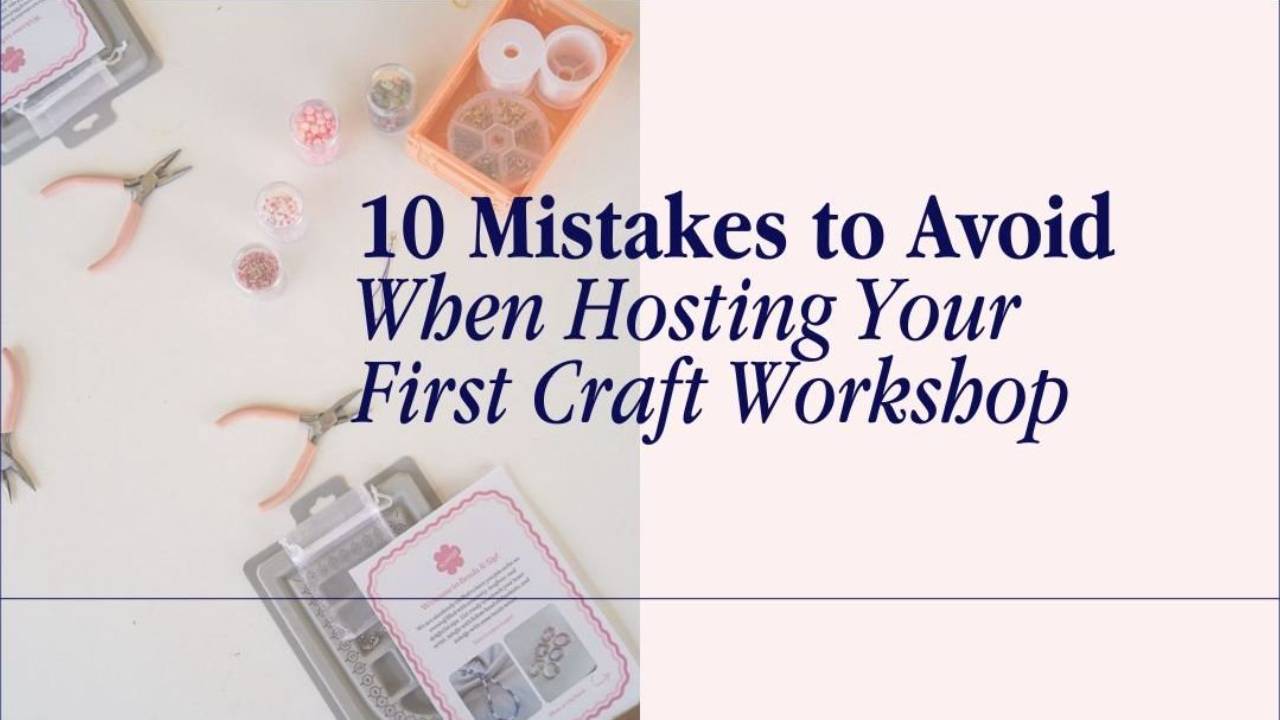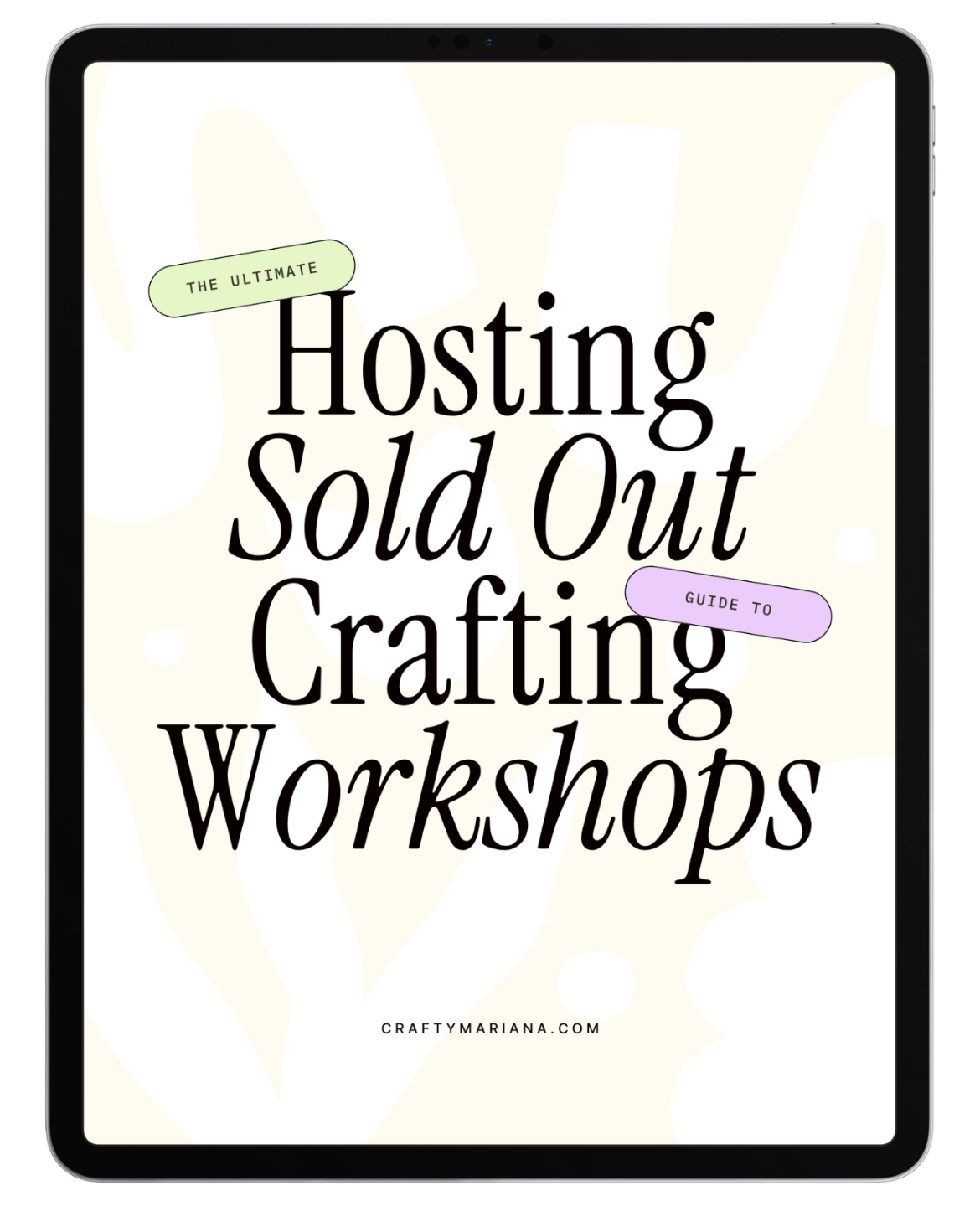10 Mistakes to Avoid When Hosting Your First Craft Workshop

Hey, craft enthusiast! 🎨
If you’re here, you’re probably on the exciting journey of planning your first craft workshop. First of all, congratulations! Hosting a workshop is a fantastic way to share your passion, connect with like-minded people, and maybe even earn some extra cash (that’s called a triple win!).
But let's be real: starting out can be a bit overwhelming. From planning to promoting, there are a lot of moving parts that go into making a workshop successful. And while it’s normal to make mistakes, some pitfalls can be easily avoided with a bit of preparation and foresight. So, to help you kick off your first workshop without a hitch, I’ve put together a list of 10 common mistakes to avoid and how to sidestep them. Let’s dive in!
1. Not Defining Your Target Audience 🎯
The Mistake: Jumping in without a clear idea of who your workshop is for.
Why It’s a Problem: If you don’t know who you’re targeting, you won’t know how to market your workshop or what craft to teach. This could lead to low attendance or an audience that doesn’t match your teaching style.
How to Avoid It: Spend some time defining your ideal participant. Are they beginners or advanced crafters? What age group do they fall into? Knowing your audience helps you tailor your content, marketing, and approach.
2. Skipping the Planning Stage 🗓️
The Mistake: Not having a structured plan for your workshop.
Why It’s a Problem: Without a plan, your workshop could end up feeling disorganized, and you might forget important steps or materials.
How to Avoid It: Create a detailed outline of your workshop, including the materials needed, the flow of activities, timing, and any breaks. A clear plan helps ensure everything runs smoothly and on time.
3. Choosing the Wrong Venue 🏠
The Mistake: Picking a venue that’s too small, too big, or not suitable for the craft you’re teaching.
Why It’s a Problem: The wrong venue can make participants uncomfortable or restrict the activities you can offer. It could also affect the overall vibe and experience of the workshop.
How to Avoid It: Visit potential venues in person if possible. Consider factors like space, lighting, accessibility, and the overall atmosphere. Make sure the venue fits your needs and enhances the experience.
4. Not Testing Your Craft Project First 🧪
The Mistake: Planning to teach a craft without testing it out yourself first.
Why It’s a Problem: You could run into unexpected challenges or realize that the project is too complicated for your audience, leading to frustration and a poor experience.
How to Avoid It: Always do a test run of the craft you plan to teach. This allows you to troubleshoot any issues, refine the process, and ensure it’s suitable for your participants.
If you have been following me for a while on Instagram, you’ll know some specific epic mistakes I’ve done when I skipped this stage!
5. Underestimating Material Costs and Needs 💸
The Mistake: Not calculating the total cost of materials or failing to bring enough supplies.
Why It’s a Problem: Running out of materials during the workshop or realizing you’ve overspent can lead to stress and disappointment for both you and your participants.
How to Avoid It: Make a detailed list of all the materials you’ll need and overestimate slightly to account for mistakes or extras. Calculate the total cost and factor this into your pricing to ensure you’re not out of pocket.
Figuring out your numbers is the NUMBER ONE thing that will allow you to actually make a profit! Ticket sales DO NOT equal profit. I have seen many workshop hosts with sold-out sessions and empty bank accounts. You need to know your costs AHEAD of the workshop AND you need to price your workshop correctly. (This is my favorite part of my program, I love geeking over numbers…)
6. Poor Promotion and Marketing 📣
The Mistake: Assuming people will find your workshop on their own without proper promotion.
Why It’s a Problem: If people don’t know about your workshop, they won’t sign up. Simple as that.
How to Avoid It: Use a mix of online and offline marketing strategies to promote your workshop. Utilize social media, email newsletters, local community boards, and word of mouth to spread the word. Make sure your promotional material is clear and enticing!
7. Overloading Your Workshop with Too Much Content 📚
The Mistake: Trying to pack too much information or too many activities into one session.
Why It’s a Problem: Participants may feel overwhelmed or rushed, which can detract from the learning experience and enjoyment.
How to Avoid It: Focus on quality over quantity. Choose one main project or a few small, complementary activities. Ensure there’s plenty of time for participants to learn, create, and ask questions without feeling rushed.
8. Not Engaging with Your Participants 🗣️
The Mistake: Focusing solely on the craft without interacting with your participants.
Why It’s a Problem: Workshops are as much about the experience and connection as they are about the craft. A lack of engagement can make your workshop feel cold and impersonal.
How to Avoid It: Make an effort to engage with each participant. Ask questions, offer assistance, share stories, and encourage a relaxed, friendly atmosphere. Building rapport makes the experience more enjoyable for everyone.
9. Failing to Gather Feedback 📋
The Mistake: Not asking for feedback from participants after the workshop.
Why It’s a Problem: You miss out on valuable insights that could help you improve future workshops.
How to Avoid It: Provide a simple feedback form at the end of your workshop, or send out a follow-up email asking for feedback. Use this information to learn what worked well and what could be improved.
10. Forgetting to Follow Up 📨
The Mistake: Not keeping in touch with your participants after the workshop.
Why It’s a Problem: Following up is crucial for building relationships, encouraging repeat attendance, and promoting future workshops.
How to Avoid It: Send a thank-you email to participants after the workshop, along with any additional resources or information you promised. Keep them engaged with regular updates and invitations to future events.
Hosting your first craft workshop can be a thrilling experience, but it’s essential to avoid these common mistakes to ensure it’s a hit! By planning carefully, engaging with your audience, and learning from each experience, you can create a memorable workshop experience that leaves participants excited to come back for more.
If you’re looking for more guidance on hosting successful craft workshops, the Crafts Workshops Academy is here to help! My comprehensive program covers everything from planning and promotion to running seamless events and growing your workshop business.
Ready to turn your passion into a thriving workshop venture? Join the Crafts Workshops Academy today and start your journey to becoming a confident, successful workshop host! 🎨✨
P.S. Got questions or need more tips? Leave a comment or shoot me a message—I’d love to help you out! 😊
Stay connected with news and updates!
Join our mailing list to receive the latest news and updates from our team.
Don't worry, your information will not be shared.
We hate SPAM. We will never sell your information, for any reason.







